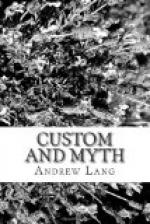The opinion of Mr. Max Muller has always a right to the first hearing from English inquirers. Mr. Muller, naturally, examines first the name of the god whose legend he is investigating. He writes: ’There is no such being as Kronos in Sanskrit. Kronos did not exist till long after Zeus in Greece. Zeus was called by the Greeks the son of Time ([Greek]). This is a very simple and very common form of mythological expression. It meant originally, not that time was the origin or source of Zeus, but [Greek] or [Greek] was used in the sense of “connected with time, representing time, existing through all time.” Derivatives in -[Greek] and -[Greek] took, in later times, the more exclusive meaning of patronymics. . . . When this (the meaning of [Greek] as equivalent to Ancient of Days) ceased to be understood, . . . people asked themselves the question, Why is Zeus called [Greek]? And the natural and almost inevitable answer was, Because he is the son, the offspring of a more ancient god, Kronos. This may be a very old myth in Greece; but the misunderstanding which gave rise to it could have happened in Greece only. We cannot expect, therefore, a god Kronos in the Veda.’ To expect Greek in the Veda would certainly be sanguine. ’When this myth of Kronos had once been started, it would roll on irresistibly. If Zeus had once a father called Kronos, Kronos must have a wife.’ It is added, as confirmation, that ’the name of [Greek] belongs originally to Zeus only, and not to his later’ (in Hesiod elder) ‘brothers, Poseidon and Hades.’ {58a}
Mr. Muller says, in his famous essay on ‘Comparative Mythology’ {58b}: ‘How can we imagine that a few generations before that time’ (the age of Solon) ’the highest notions of the Godhead among the Greeks were adequately expressed by the story of Uranos maimed by Kronos,—of Kronos eating his children, swallowing a stone, and vomiting out alive his whole progeny. Among the lowest tribes of Africa and America, we hardly find anything more hideous and revolting.’ We have found a good deal of the sort in Africa and America, where it seems not out of place.
One objection to Mr. Muller’s theory is, that it makes the mystery no clearer. When Greeks were so advanced in Hellenism that their own early language had become obsolete and obscure, they invented the god [Greek], to account for the patronymic (as they deemed it) [Greek], son of [Greek]. But why did they tell such savage and revolting stories about the god they had invented? Mr. Muller only says the myth ’would roll on irresistibly.’ But why did the rolling myth gather such very strange moss? That is the problem; and, while Mr. Muller’s hypothesis accounts for the existence of a god called [Greek], it does not even attempt to show how full-blown Greeks came to believe such hideous stories about the god.
* * * * *




